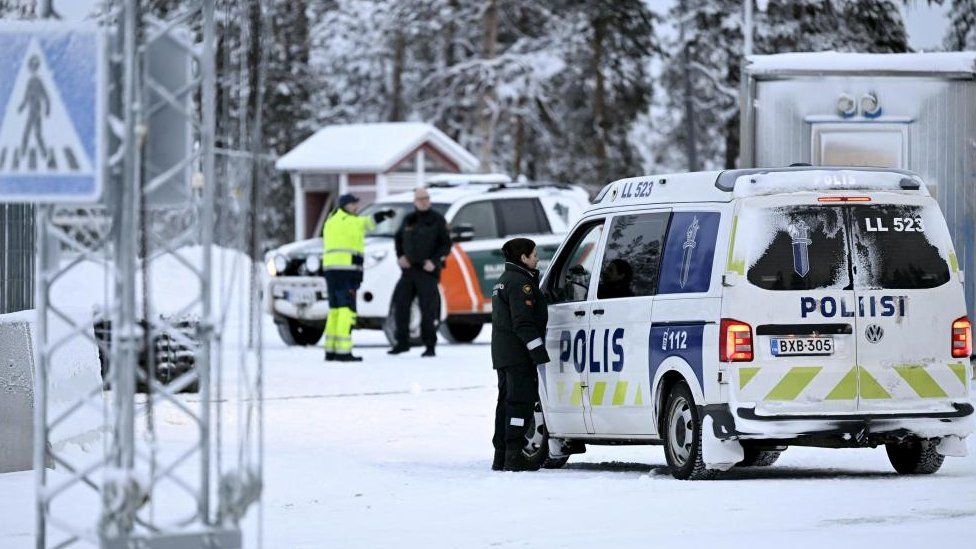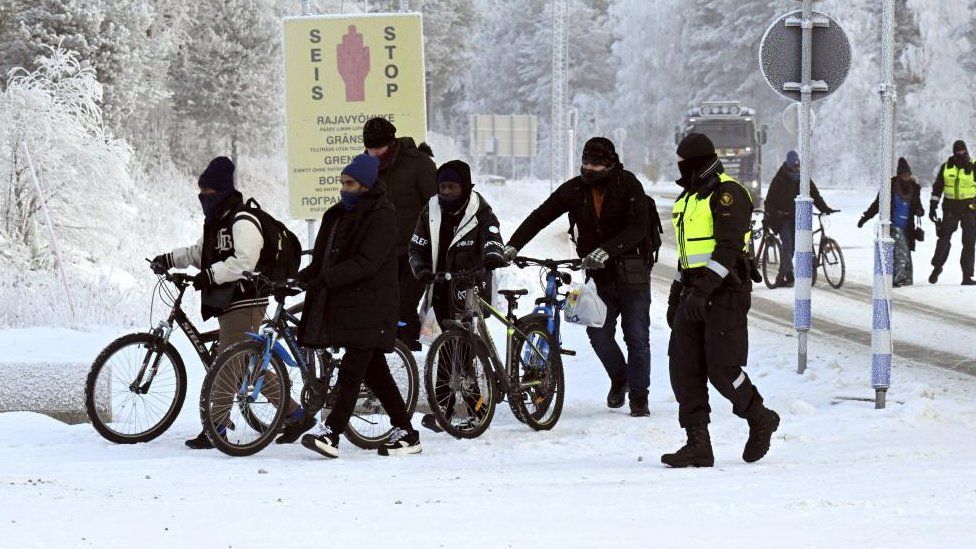Russia is trying to recruit foreign migrants, detained in a recent sweep at its border with Finland, for its war in Ukraine.
The BBC has seen evidence of several cases in which foreigners were rushed into a military camp on the border with Ukraine, days after they were picked up for breaching immigration laws.
The practice of coercing people in pre-deportation detention centres to sign contracts for army service in Ukraine is not new, but the numbers swelled as foreign migrants arrived at Russia’s 1,340-km (833-mile) border with Finland.
Finland temporarily closed all eight of its Russian border crossings, accusing Moscow of channelling migrants and asylum seekers there as part of a destabilisation campaign after the government in Helsinki joined Nato earlier this year.
Analysis of court hearings in Karelia, one of three Russian regions bordering Finland, showed that in the past three weeks, 236 people were arrested for staying in Russia without valid visas, destined for deportation. The picture was similar in the other two border regions of Leningrad and Murmansk.
Among those appearing in court in Karelia was a Somali man in his 40s, who was arrested in mid-November, sentenced to a fine of 2,000 roubles (£17; €20) and detained pending deportation – a standard procedure for anyone without an appropriate visa.
Awad and at least a dozen other inmates held in the pre-deportation centre in Petrozavodsk, Karelia’s capital, were approached by military representatives soon after their arrest and were offered “a job for the state”. They were promised good pay, medical care and permission to stay in Russia on completing a one-year army contract.
Awad is not his real name, but the BBC has confirmed his identity.
He had arrived in Russia in mid-July and went to neighbouring Belarus, trying for months to enter Poland. By early November, he said internet chat groups popular with asylum seekers were abuzz with news that the Russian border with Finland had become more accessible.

Unprecedented numbers of migrants began turning up at Finland’s border and applying for refugee status.
Finnish authorities accused Russia of encouraging the influx and abandoning their usual visa checks for travellers entering the border zone.
They highlighted the organised distribution of bicycles, most of them brand new, which migrants used to cover the last stretch of the Russian border zone, bypassing Russia’s ban on approaching its border posts on foot.
Finland’s last border crossing at Raja-Jooseppi shut on 29 November, although authorities in Helsinki were planning to reopen the border later this month. Those arriving by air or sea can still seek asylum.
Awad told the BBC that he hired a taxi on 14 November and, along with another Somali migrant, was driven for several hours from St Petersburg to Lakhdenpokhya, a town in Karelia 30km from the Finnish border.
They were acting on their own and no-one had helped them, he maintained.
His case was typical. His month-long visa had run out in August and when the taxi was stopped by police for a check, he was arrested. Awad and a dozen other people were sentenced the next day and moved to the detention centre.
Human rights groups say that foreigners using Russia as a transit point in their journey to the West routinely overstay their short-term visas while trying to cross borders with EU countries.
So when police began arresting those who did not have valid Russian visas in mid-November, it marked a change in Russia’s approach to migrants at the Finnish border.
The documents offering a job which were presented by officials to the Somali and others were in Russian, which none of the group could understand. He and others assumed they would be given army-related work inside Russia, he said.
“We were not given the contract documents and [they] were not even shown properly. We asked [what the jobs will be] but they told us that it is simple and good,” he told the BBC.
Fearing deportation to Somalia, where he said his life had been threatened several times by al-Shabab militants, he signed the offer, along with five other Somalis, five men from Arab countries and a Cuban national. They were put on a bus and were driven south.
The BBC has asked Russia’s interior ministry in Karelia for information on how many other inmates have been released from such detention centres, but so far there has been no response.
We have also confirmed the identity of another man in the group, whose name matched the court records in Karelia.

Separately, an Iraqi man who was also arrested close to Finland’s border told human rights activists that he too was being pressured to sign an army contract as a way to void the deportation order.
He said his life was in grave danger if he returned to Iraq. It is not known if he agreed to sign.
Earlier this week, Somalia’s Radio Kulmiye interviewed an unnamed representative from the Somali community in Belarus, who said at least 60 Somali nationals were being held in Russian detention centres and were being approached by military recruiters.
According to him, at least eight men had agreed to sign a contract with the Russian army.
Awad told BBC that his bus journey ended at the border with Ukraine, in a muddy military camp made of large tents.
That was when his group realised they were being sent to fight, he said: “We were told a contract year with training and options with good pay and care, but no Ukrainian borders and war. Everything we were told was a lie.”
The BBC has again approached the Russian interior ministry for comment on allegations that foreign detainees are being offered army contracts in exchange for their release.
The foreigners at that point demanded that their contracts were annulled. Awad said officials at the camp threatened them with long prison sentences for breaching military laws, but later retreated, saying that the job offers would be cancelled and deportation procedures would resume.
Four men in the group had received letters confirming that, he said. The BBC has not seen those letters.
For now, they remain in the military camp. Awad said he had been told a “video session with a court” would be conducted soon, but was unable to provide details on what the hearing would be about.
He is adamant he has been duped into signing up to the Russian army, although his only defence is that he did not fully understand the offer made to him.
“I said no, because I don’t know what I signed and it is not written in my language,” he said. “I am an asylum seeker, not a soldier.”

